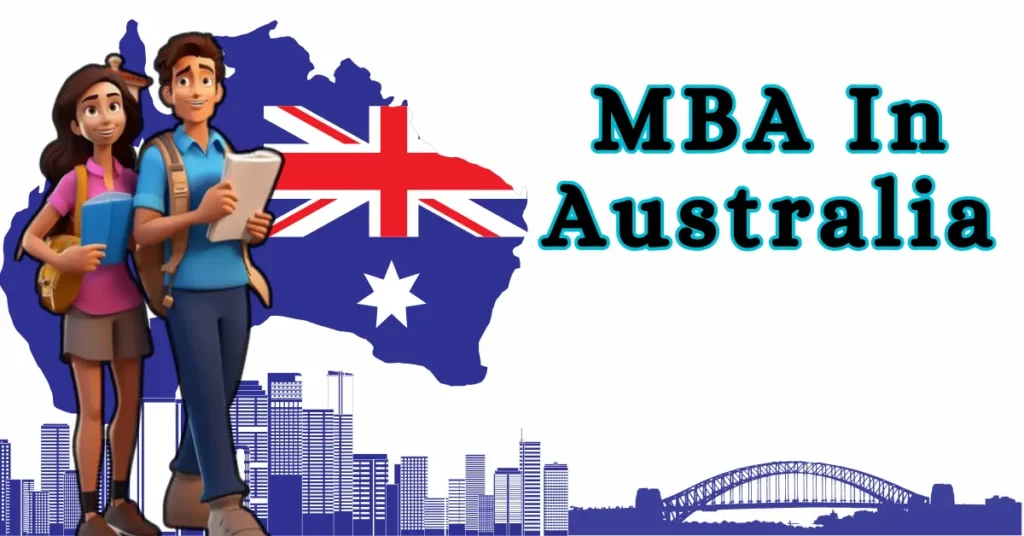
Table of Contents
- Why study in Australia for MBA?
- Top universities in Australia for MBA
- Eligibility requirements
- Application process
- Cost of studying MBA in Australia
- Scholarships for MBA in Australia
- Job opportunities for MBA in Australia
- Frequently Asked Questions
According to High Commission of India, Canberra’s report, 1,22,391 Indian students were studying in Australia in January – September 2023 period. The Times of India reports a huge outflow of Indian students to Australia in recent years for higher education degrees.
Among those top sought-after courses comes MBA, according to universities and multiple other sources. Australia has more than 30 universities offering MBA courses with specializations in various areas. Ranked by globally renowned organizations, MBA in Australia is reputed for their theoretical and practical teaching excellence.
Why study in Australia for MBA?
- Globally recognized programs: Australian universities hold global reputation and MBA from these institutions are accepted across the globe.
- Academic excellence: Australia has a high rank in the quality of tertiary education. The universities offer practical training and internship opportunities for MBA students in collaboration with global-top companies and organizations.
- Cultural exposure: Australia, the English-speaking country in Oceania, is a hub of Eastern and Western cultures. Your experience in Australia will give you deeper insights on business, career, and life in general.
- Tropical weather conditions: No country is better than Australia in terms of weather conditions. The tropical weather conditions are perfect for international students who need to worry about extreme heat or cold.
- Innovative business environment: Australia encourages an innovative environment for international students to give in and take away. In fact, the government supports innovation and contributions from international students through scholarships and exchange programs.
- Post-study work opportunities: As the country hosts a stable economy of steady growth, the work opportunities are ample for international students. MBA graduates can explore and find top opportunities and work in Australia post their studies.
Top universities in Australia for MBA
When you plan your MBA study in Australia, we recommend you prioritize the top universities. They will provide the best available resources in the country to fulfill your academic and career needs. According to the latest world university rankings, the following are the top-ranking universities in Oceania for MBA.
| QS Rankings 2024 (Oceania) | University | Full-time MBA Tuition Fee |
| 1 | Melbourne Business School, Melbourne University | 106,650 AUD |
| 2 | University of New South Wales | 106,680 AUD |
| 3 | University of Sydney Business School | 55,000 AUD |
| 4 | The University of Queensland Business School | 91,421 AUD |
| 5 | Monash Business School, Monash University | 53,000 AUD |
| 6 | Macquarie Business School, Macquarie University | 44,500 AUD |
| 7 | Australian National University | 48,035 AUD |
| 8 | University of Western Australia Business School | 47,600 AUD |
| 9 | University of Technology Sydney Business School | 48,096 AUD |
| 10 | Unisa Business School, University of South Australia, Australia | 43,800 AUD |
Eligibility requirements
Before you apply for MBA to an Australian university, make sure you meet the eligibility requirements prescribed. Given below is a general list of application requirements. Be mindful that the requirements may be more than what is given below, as decided by the university you are applying for admission.
- A bachelor’s degree in a relevant field
- A minimum GPA of 2.0 – 3.0
- GMAT or GRE
- English proficiency proof – IELTS, TOEFL, PTE, Duolingo, etc.
- A resume
- Letter of Recommendation – minimum 1 – 2, as demanded by the university of application
- Academic transcripts
- A personal essay
Application process
Applying for an MBA at an Australian university requires you to go through the guidelines. Make your online application timely in the right intake.
For an easy application process, get help from our expert counselors. They will evaluate your profile and guide you in admission and education loan options. All the services are provided by experienced counselors at zero cost to you. Click here to connect with us and get expert answers to your concerns.
Cost of studying MBA in Australia
International students must gather funds to meet the tuition fee, other academic expenses, and living costs in Australia. The total cost can vary significantly from city to city and from university to university.
- According to the Australian Parliament report on higher education, the average postgraduate tuition fee for international students ranges between 20,000 – 50,000 AUD. For an MBA, it can be up to or more than 100,000 AUD.
- According to the Australian government, an international student requires at least 24,505 AUD to meet the living expenses.
- While studying, you can work part-time not more than 48 hours a fortnight. The average wage is 22.23 AUD per hour.
Assess your living costs based on your city of living. The table below shows the cost of living in Sydney.
| Category | Annual Expense in Sydney |
| Rent or Shared Apartments | 18,200 AUD |
| Groceries | 5,200 AUD |
| Internet or Phone | 1,560 AUD |
| Gas or Electricity | 1,040 AUD |
| Books or Supplies | 832 AUD |
| Transportation | 1,820 AUD |
Scholarships for MBA in Australia
There are various scholarships available for MBA in Australia funded by government and private organizations. Some of the top options are given below:
| Scholarship | Amount or Expenses Covered |
| Kraft Heinz Scholarship | 12,000 USD |
| Monash International Leadership Scholarship | 100% of the tuition fee |
| University of Adelaide MBA Scholarship | Tuition fee coverage |
| Destination Australia scholarship | 15,000 USD |
| Australia Awards Scholarship | Full study expenses |
Job opportunities for MBA in Australia
According to data from different universities, MBA graduates of Australian universities have a good chance of securing top job roles across industries. Managers, consultants, and analysts are some job roles to mention. See the table below for average salary for different MBA jobs in Australia:
| Job Title | Average Salary in Australia |
| Project Manager | 150,000 – 200,000 AUD |
| General Manager | 140,000 – 160,000 AUD |
| Business Consultant | 100,000 – 120,000 AUD |
| Healthcare Administrator | 80,000 – 90,000 AUD |
| Financial Analyst | 75,000 – 100,000 USD |
| IT Manager | 120,000 – 140,000 AUD |
| Supply Chain Manager | 135,000 – 155,000 AUD |
| HR Manager | 115,000 – 135,000 AUD |
| Risk Manager | 135,000 – 155,000 AUD |
| Management Analyst | 110,000 – 130,000 AUD |
Thus, an MBA from an Australian university is a great career decision for many reasons. Studying in Australia for MBA gives you the necessary academic knowledge, industry exposure, and learnings for a successful career.
If you are planning to apply for an MBA in Australia, don’t waste your time for daunting concerns. Connect with our counselor and get answers to all your queries. Explore guidance in admissions and education loan options at zero cost.
Frequently Asked Questions
Is Australia a good choice for MBA?
Definitely. Australia houses globally ranked universities for MBA. Having an MBA degree from an Australian university is highly advantageous for your career growth.
Can I apply for PR after MBA in Australia?
Yes. You can apply for PR in Australia after completing your MBA and stay in the country.
Which MBA program has high demand in Australia?
In Australia, MBA programs are offered with popular specializations, such as Marketing, Finance, Human Resource, etc. These MBA programs have a high demand in different industries.
Is it tough to get MBA admission in Australia?
Getting admission to an Australian university for an MBA can be tougher, given the competition every year. However, if you have a very good GPA and other requirements, you can look forward to admission success.
Is IELTS mandatory for MBA in Australia?
Typically, proof of English proficiency is required from international students for MBA in Australia. It is waived for selecting students with conditions, such as work experience. If no waiver, international students must submit proof of English proficiency like IELTS, TOEFL, PTE, etc.

